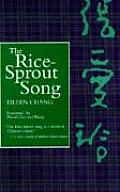
| Publisher: | University of California |
| Copyright: | 1955 |
| Printing: | 1998 |
| ISBN: | 0-520-21088-3 |
| Format: | Trade paperback |
| Pages: | 182 |
The Rice-Sprout Song opens with Gold Root and his family escorting Gold Flower, his sister, to a neighboring village to register for a wedding. The setting is rural China during the Maoist land reform of the early 1950s. Gold Root's wife, Moon Scent, has been working in the city during the start of land reform and the divsion of the land, leaving her husband to raise their daughter, but returns to the country in the third chapter. She was told repeatedly by her employer, who was not allowed to dismiss her, that life was wonderful in the country after land reform and that she should go home and work in the country because the life would be better.
The abject poverty of the Chinese rural population after land reform is the central focus of this book, leavened with a portrayal of the effects of politics on communication. This book is full of characters who don't say things openly, partly because of the danger of being frank about certain topics, partly because of alienation, partly because speaking about things doesn't help anything and therefore they're not talked about. It's not a book where that lack of communication becomes confusion or farce as a plot element; rather, it's a book that explores the futility and corruption of communication in words, and tries to grapple with how to express despair.
As you might have guessed, it's not a book to read when you want to be cheered up.
It's worth being aware that this book was commissioned by the US government as, in essence, propaganda. It doesn't show in the quality of the writing, which is superb, and Maoist land reform is certainly easy to attack without taking much dramatic license. However, given its background, I would look elsewhere for researched factual accounts and enjoy The Rice-Sprout Song as fiction, taking its portrayal of the specific politics of China with a grain of salt.
Chang combines here an approach and a style of writing that I associate strongly with mainstream fiction, as distinct from the genre fiction that I normally read: a realist tone. Most modern fiction is realist in the sense of using realist techniques for description and usually removing the narrator from the work. But the narrative voice in The Rice-Sprout Song tries hard to disappear, offering only indirect commentary via descriptions of the feelings and perspectives of characters. The book is primarily description: tight, close, detailed and often poetic description of the actions, surroundings, attitudes, and words of the characters. Most emotions, and all political commentary, is unstated, behind the text, waiting for the reader to dig out and connect.
And sometimes, as here, that strong realist mode carries with it a sense of fatality. One of the basic assumptions of most of the fiction I read is that the characters are capable of changing the world. Perhaps it's only in a small, local way, although with SF it's often in a much larger way. But the characters are capable, in some sense, of being heroes. The Rice-Sprout Song is written in a realist mode that doesn't admit heroism. Surrounding events are larger than individual people and have vast, impersonal force, and the basic mode of the story is descriptive rather than revolutionary or even analytical. Chang is particularly grim this way. Her characters rarely even get the solace of inner transformation or fulfillment. They make the choices they can, but it's very hard to have a positive effect on the world.
This is a depressing book, but it's not at all a bad book. It's beautifully written: sparse, vivid, and thoughtful in its portrayals, and elegantly short and effective. The descriptions evoke place and mood as well as anything I've read recently. I had a hard time liking any of the characters, in part because it can be hard to like broken people and all of the characters are broken in one way or another, but they're so vividly themselves that I found them fascinating somewhat despite myself.
One other minor complaint: I think the choice to translate Chinese names into English nouns was partly due to the period in which this book was written, but it mildly bugged me throughout the book. Read from the perspective of 2011, it feels distracting. It creates an undercurrent of "listen to the strange names Chinese people have," when if you translated English names into their noun meanings, they'd sound just as weird. I'm glad Chinese literature in English doesn't do this any more.
I'm not sure I'd read a lot of fiction like this, since at the end of the book I was just left feeling depressed. But the process of reading, of savoring the language and descriptions, was enjoyable enough that I'll probably read the other book of Chang's I was loaned. I understand why others admire it, even if I prefer less realism and more heroism, even if the heroism is local, minor, or personal.
Reviewed: 2011-05-14